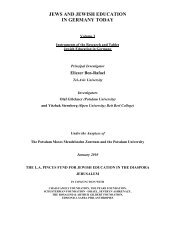jews and jewish education in germany today - The Westbury Group
jews and jewish education in germany today - The Westbury Group
jews and jewish education in germany today - The Westbury Group
Create successful ePaper yourself
Turn your PDF publications into a flip-book with our unique Google optimized e-Paper software.
person’s m<strong>in</strong>d <strong>in</strong> mak<strong>in</strong>g a decision. So, if you say that you can’t keep kosher, because there is no kosher<br />
food available, that’s a problem, <strong>and</strong> we have to make it possible that everybody can buy kosher food. If<br />
anybody says later that they don’t want to keep kosher, that’s his or her bus<strong>in</strong>ess, but the opportunity,<br />
however, is given. And as we have to provide the right possibilities not only <strong>in</strong> material th<strong>in</strong>gs, we also have<br />
to provide it conceptually. Whether the people are tak<strong>in</strong>g the opportunities or not, whether people want to<br />
study religion <strong>and</strong> tradition or not, we are go<strong>in</strong>g to make it possible for them.<br />
● Can you just give a short overview of the programs now offered by the Lauder yeshiva <strong>in</strong> Berl<strong>in</strong>?<br />
<strong>The</strong>re’s a wide rang<strong>in</strong>g program now <strong>in</strong> the yeshiva, start<strong>in</strong>g with beg<strong>in</strong>ners, attended mostly by high school<br />
pupils or university students, they study here <strong>in</strong> the even<strong>in</strong>gs. <strong>The</strong>re’s also a full time program, usually for<br />
people who are post-high school <strong>and</strong> pre-university. <strong>The</strong>y study full time, for one or two or three years. At<br />
the end of the third year we encourage the people to cont<strong>in</strong>ue their <strong>education</strong> at a college or university except<br />
for those who <strong>in</strong>tend to jo<strong>in</strong> the Rabb<strong>in</strong>ical program.<br />
Now there’s someth<strong>in</strong>g that is actually a new <strong>and</strong> <strong>in</strong>dependent <strong>in</strong>stitution, it’s called the Rabb<strong>in</strong>ersem<strong>in</strong>ar zu<br />
Berl<strong>in</strong>, which is the historical name of the Hildesheimer Rabb<strong>in</strong>ical Sem<strong>in</strong>ary. This will be then a Germanwide<br />
federal <strong>in</strong>stitution <strong>in</strong> the Brunnenstrasse, which is where the Lauder yeshiva is.<br />
● How many students are visit<strong>in</strong>g now the Rabb<strong>in</strong>ical program at the Rabb<strong>in</strong>ersem<strong>in</strong>ar zu Berl<strong>in</strong>?<br />
<strong>The</strong>re are n<strong>in</strong>e at the moment, <strong>in</strong>clud<strong>in</strong>g two who are about to be orda<strong>in</strong>ed.<br />
● How many of them do you th<strong>in</strong>k <strong>in</strong>tend to work after ord<strong>in</strong>ation as Rabbis <strong>in</strong> Germany?<br />
I can’t give a guarantee, but I guess all of them want to be Rabbis <strong>in</strong> Germany then.<br />
● Where do the participants come from?<br />
It’s a very <strong>in</strong>terest<strong>in</strong>g mix. From the two graduates now, one is from Budapest, <strong>and</strong> the other one is a former<br />
immigrant from Russia. One will serve, <strong>in</strong> the future, as Rabbi <strong>in</strong> Leipzig, the other one will serve <strong>in</strong><br />
Cologne. And the other students, one is an American who came here with a Fulbright scholarship, there’s<br />
another native German Jew, <strong>and</strong> the rest are immigrants from the Former Soviet Union.<br />
● You mentioned that there was, at the very beg<strong>in</strong>n<strong>in</strong>g, a midrasha <strong>in</strong> Frankfurt am Ma<strong>in</strong>, but then you<br />
moved it to Berl<strong>in</strong>? Why?<br />
We had several reasons to take this step. <strong>The</strong> first was an <strong>in</strong>tention from the general project perspective. It<br />
means the sum of the parts is just greater <strong>in</strong> one place, or the effects are just stronger. It had also the effect<br />
that we had a lot of chuppot here <strong>in</strong> Berl<strong>in</strong>, alone <strong>in</strong> the first year 12 wedd<strong>in</strong>gs!<br />
Another reason was f<strong>in</strong>ancial. We rented facilities <strong>in</strong> Frankfurt at great cost, <strong>and</strong> <strong>in</strong> Berl<strong>in</strong>, we had a much<br />
better <strong>in</strong>frastructure. Local support, for example, by Dr. Roman Skoblo [ an important Jewish donor <strong>in</strong><br />
Berl<strong>in</strong>, O.G.], helped a lot.<br />
● Are there other projects <strong>in</strong> German towns which are supported by the Lauder Yeshurun community?<br />
Yes, Lauder Yeshurun is committed to projects <strong>in</strong> Leipzig <strong>and</strong> Hamburg, <strong>and</strong> separately, <strong>The</strong> Ronald S.<br />
Lauder Foundation supports the Lauder-Moriah-School <strong>in</strong> Cologne <strong>and</strong> the Lauder K<strong>in</strong>dergarten of the<br />
Jewish Community <strong>in</strong> Hamburg.<br />
● How many kids did you start with <strong>in</strong> the Lauder primary school <strong>in</strong> Berl<strong>in</strong> <strong>in</strong> 2008?<br />
125 | P a g e



